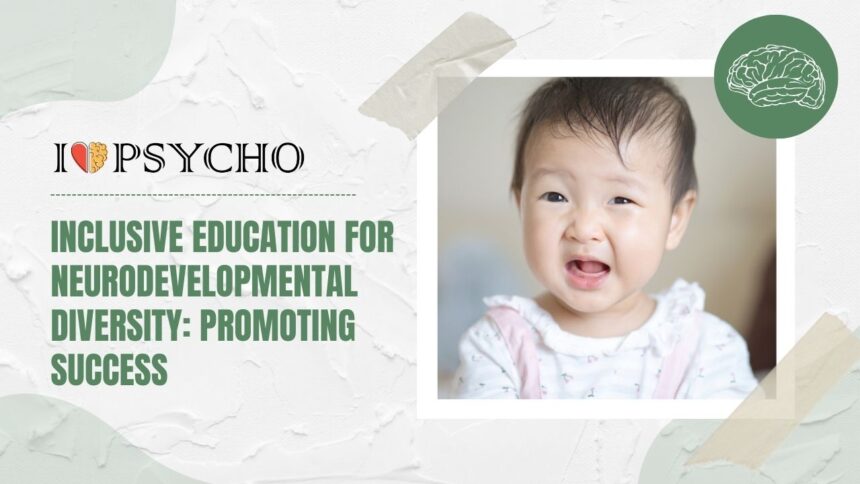Welcome to a world where every mind is valued, every voice is heard, and every individual’s unique way of learning is embraced. In today’s blog post, we delve into the realm of inclusive education for neurodevelopmental diversity – a transformative approach that celebrates differences and promotes success for all learners. Join us on this journey as we explore the challenges faced by individuals with neurodevelopmental differences in traditional education and discover the power of inclusive classrooms in unlocking the full potential of every student. Let’s champion diversity, foster understanding, and pave the way for educational excellence together!
What is Neurodevelopmental Diversity?
Neurodevelopmental diversity encompasses a spectrum of conditions that affect the brain’s development and function. It includes disorders such as autism, ADHD, dyslexia, and intellectual disabilities. These differences can impact how individuals learn, communicate, and interact with the world around them.
Each person with neurodevelopmental diversity has their own unique strengths and challenges. Some may excel in certain areas like creativity or problem-solving, while facing difficulties in others like social skills or organization.
It’s important to recognize that neurodiversity is not a one-size-fits-all concept – it celebrates the beautiful complexity of the human brain and emphasizes the need for individualized support and accommodation in educational settings. By embracing neurodevelopmental diversity, we create inclusive environments where every student can thrive and reach their full potential.
Challenges Faced by Individuals with Neurodevelopmental Differences in Traditional Education
Neurodevelopmental differences can present unique challenges in traditional education settings. Students with conditions such as ADHD, dyslexia, autism spectrum disorder, or intellectual disabilities may struggle to keep up with the pace of mainstream classrooms. The one-size-fits-all approach often fails to address their individual learning needs.
These students might face difficulties with attention span, reading comprehension, social interactions, or sensory sensitivities that can hinder their academic progress. Traditional teaching methods that rely heavily on lectures and written assignments may not cater to their diverse learning styles. As a result, these individuals may feel frustrated, misunderstood, or left behind in the educational system.
Moreover, the stigma surrounding neurodevelopmental disorders can lead to negative stereotypes and misconceptions about these students’ capabilities. They may encounter bullying or discrimination from peers and even educators who lack awareness and sensitivity towards their challenges.
Inclusive education offers a more holistic approach by embracing diversity and providing tailored support for students with neurodevelopmental differences. By fostering an inclusive environment that celebrates each student’s strengths and accommodates their specific needs, schools can create a more equitable learning experience for all learners.
The importance of inclusive education for neurodevelopmental diversity
Inclusive education for neurodevelopmental diversity is not just a trend; it’s a necessity in today’s diverse world. Every student deserves the opportunity to learn and grow, regardless of their differences. When we embrace neurodiversity in the classroom, we create an environment where all students feel valued and supported.
Traditional education systems often fail to meet the unique needs of individuals with neurodevelopmental differences. Inclusive education challenges this status quo by promoting acceptance, understanding, and tailored support for every learner. By fostering inclusivity, we empower students with neurodiversity to reach their full potential and thrive academically.
The importance of inclusive education goes beyond academics; it cultivates empathy, respect, and a sense of belonging among students. It prepares them for a society that celebrates diversity rather than stigmatizing differences. Promoting inclusive education for neurodevelopmental diversity creates a more equitable and compassionate learning environment for all.
Understanding neurodevelopmental disorders and their impact on learning
Neurodevelopmental disorders are conditions that affect the brain’s development, impacting how individuals learn and process information. These disorders can manifest in various ways, such as ADHD, autism spectrum disorder, dyslexia, and intellectual disabilities. Each disorder presents unique challenges for learning and social interactions.
Individuals with neurodevelopmental disorders may struggle with attention span, sensory sensitivities, communication difficulties, or academic performance. These challenges can often lead to feelings of frustration and isolation in traditional educational settings where individualized support may be lacking.
Understanding the specific nature of each neurodevelopmental disorder is crucial for creating inclusive learning environments that cater to diverse needs. By recognizing these differences and providing appropriate accommodations and interventions, educators can help students reach their full potential academically and socially.
Empathy, patience, and a willingness to adapt teaching strategies are key when supporting students with neurodevelopmental differences in their learning journey. It’s important to foster a nurturing and understanding environment where every student feels valued and empowered to succeed despite their unique challenges.
Benefits of inclusive education for students with neurodevelopmental differences
Inclusive education offers a myriad of benefits for students with neurodevelopmental differences. It fosters a sense of belonging and acceptance, creating an environment where every child feels valued and supported. By embracing diversity in the classroom, students learn to appreciate each other’s unique strengths and perspectives.
Inclusive education also promotes social skills development by encouraging collaboration and empathy among peers. Students with neurodevelopmental differences have the opportunity to interact with their classmates in meaningful ways, fostering friendships that transcend labels or stereotypes.
Furthermore, inclusive classrooms provide personalized support tailored to each student’s needs. This individualized approach ensures that all learners receive the necessary accommodations and modifications to thrive academically. As a result, students with neurodevelopmental differences can reach their full potential and achieve success in their educational journey.
Inclusive education not only benefits students with neurodevelopmental differences but enriches the entire learning community by promoting understanding, respect, and inclusivity for all individuals.
Strategies for promoting success in inclusive classrooms
Creating a supportive and inclusive learning environment for students with neurodevelopmental differences requires thoughtful strategies tailored to meet their unique needs. One effective approach is to provide differentiated instruction, allowing each student to learn at their own pace and in a way that suits them best.
Utilizing various sensory tools and resources can also enhance the learning experience for neurodiverse learners. Visual aids, manipulatives, and assistive technology can help reinforce concepts and improve comprehension.
Encouraging collaboration among students through group projects or peer tutoring fosters social skills development while promoting academic growth. Inclusive classrooms thrive on mutual respect, empathy, and understanding of one another’s differences.
Implementing clear communication channels between teachers, parents, and support staff ensures a holistic approach to addressing individual challenges effectively. By working together as a team, educators can provide comprehensive support for students with neurodevelopmental diversity in an inclusive setting.
Support and resources for teachers and schools implementing inclusive education
Teachers and schools implementing inclusive education for neurodevelopmental diversity have access to a variety of support and resources to ensure the success of all students. Professional development opportunities can provide educators with the tools and strategies needed to create an inclusive learning environment where every student feels valued and supported. Collaborating with special education experts, speech therapists, occupational therapists, and psychologists can also offer valuable insights into meeting the diverse needs of students with neurodevelopmental differences.
Additionally, schools can benefit from partnerships with community organizations that specialize in supporting individuals with neurodevelopmental disorders. These collaborations can provide additional resources, training sessions, and guidance on best practices for creating an inclusive school culture. Technology tools such as assistive devices, communication apps, and personalized learning platforms are also instrumental in helping teachers differentiate instruction to meet the unique needs of each student.
Furthermore, establishing strong relationships between teachers, parents, and support staff is key to fostering a collaborative approach towards promoting success in inclusive classrooms. By working together as a team and sharing expertise and experiences, educators can create a supportive network that empowers students with neurodevelopmental differences to thrive academically and socially within the educational setting.
Success stories of students with neurodevelopmental differences in an inclusive setting
Picture this: a young student with ADHD who once struggled in a traditional classroom setting now thriving in an inclusive environment. With personalized support and understanding teachers, he has found his passion for science and is excelling beyond expectations. In the same school, there’s a student with autism who used to feel isolated but now confidently participates in group activities thanks to the inclusive approach that celebrates differences.
Another success story unfolds as a dyslexic student discovers innovative learning techniques that cater to her unique needs, allowing her creativity and intelligence to shine. These students are not just surviving; they are thriving and contributing positively to their classrooms.
Inclusive education isn’t just about accommodating differences; it’s about creating opportunities for every student to reach their full potential. Through acceptance, support, and tailored strategies, students with neurodevelopmental differences can rewrite their stories of struggle into tales of triumph.
Conclusion: Embracing diversity in education
By embracing diversity in education and promoting inclusive practices, we create a learning environment where every student can thrive. It is essential to recognize and support individuals with neurodevelopmental differences so they can reach their full potential. Through understanding, empathy, and tailored support, we can foster success for all students in the classroom. Let us continue to advocate for inclusivity and celebrate the unique strengths that each individual brings to the table. Together, we can build a more equitable and empowering educational system for everyone.









